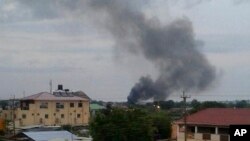Analysts in South Sudan say partners in the peace process must quickly move beyond the peace resolutions passed Friday by regional bloc IGAD and pave the way for the regional protection force expected to be dispatched soon.
Professor Jacob Chol, head of the college of political science at the University of Juba, welcomed resolutions passed by the Intergovernmental Authority on Development, especially the deployment of a regional protection force in an effort to restore stability in South Sudan.
But actions speak louder than words, he said, and unless action is taken soon, the resolutions will be worth not much more than the paper they’re written on.
“What is important here is to be able to serve this idea now," he said, noting that IGAD and South Sudanese officials needed to discuss and agree upon the size of the protection force and how it should be funded and supported.
Chol said hostilities must immediately cease in the parts of South Sudan where combat operations continue. He said negotiations by the SPLM and the SPLM-IO, under the engagement of the IGAD partners, most be focused on bringing peace to South Sudan.
Analyst Augustine Ting Mayay, a researcher with the Juba-based Sudd Institute, agreed.
“The first thing that needs to be done is to stabilize the security of the country," Mayay said. "There has been no conflict in Juba in particular, but they are having some minor violent activities taking place in the periphery.”
Mayay reiterated that IGAD must act swiftly to restore peace in South Sudan: "If we are not taking action on [the resolutions,] they may not deliver any objective.”
Return by Machar
IGAD officials have also called for SPLM-IO leader Riek Machar to return to Juba, resume his duties as first vice president and rejoin implementation of the peace agreement signed last August.
A top member of the SPLM-IO said he was cautiously optimistic that the deployment of a protection force could bring a return to calm in Juba and help parties get back on track with implementing the peace deal.
Mabior Garang de Mabior, the former water and irrigation minister appointed by Machar, said the decision by IGAD to send a protection force into Juba was a step in the right direction, but that the lack of political will by the government’s leaders was largely to blame for the slow progress in implementing the peace deal signed a year ago.
Deng Bior Deng, secretary-general of the Democratic Change Party, said additional forces could help restore confidence in Juba’s security situation. He said the tense atmosphere in Juba had taken a toll on people who worry about more fighting. "If there is something that can separate the fighting parties and then secure the lives of the civilians, then we would welcome it,” Deng said.
Garang said that he had not spoken directly to Machar since July, but that the former first vice president called for an outside protection force to help provide a buffer between the warring parties.
Ayen Bior contributed to this report from Washington.






